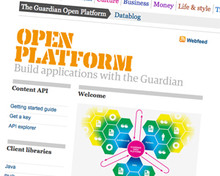
At a launch event at the Guardian's Kings Place office in London, the Guardian's editorial and technology team proudly demonstrated and described the new facility, which includes two main features: a Content API and Data Store.
It is a first-of-a-kind launch for a UK newspaper publisher, to open up its data and content for free reproduction and adaptation by its developer partners, it was announced.
'We are constantly dissatisfied with our present and trying to move into our future,' said Tim Brooks, managing director of Guardian News&Media.
A range of the facility's developers talked to a small audience of current and potential partners, describing how the site's history has led to this current innovation, now in public beta: the opening of its database so developers can use the entire content of articles and statistics and build their own applications.
While developers must apply online and have their application approved in order to access the Content API and Data Store, the hope is that it could eventually be opened up to less expert users, Matt McAlister, head of the Guardian developer network told Journalism.co.uk. "We tried to take a lot of the techno jargon out in some of the marketing copy, to make it feel more user-friendly. In the future, we hope to have tools to make it more friendly for people with some [but limited] technical skill."
The move is clearly seen as a cultural shift for the publication, which hopes to use the development in its bid to become the leading 'global liberal voice'; all part of the 'Guardian Everywhere' strategy, director of technology development, Mike Bracken, added.
Emily Bell, director of digital content at Guardian News&Media, praised they way the company's directors have allowed its web team to take risks, even from the early days of internet growth, when other newspaper publishers were not convinced that online publishing would provide a viable business model.
"We've taken a lot of risks, which other organisations haven't taken, in terms of what we do with the web," she said. The paper was early in its realisation that content could be 'disaggregated' from the format of the newspaper, she added.
From its first Guardian Unlimited site in 1999, to the opening up of 'full fat' Guardian.co.uk content in RSS feeds in 2008, the Guardian has led the way in technological development, Stephen Dunn, head of technology strategy, said.
Video and audio will not, however, be included in the open material. Answering an audience question about the release rights of material, for example the use of Reuters' stock information, Bracken said these issues would be addressed on a 'case by case' basis.
Developers demonstrated how open API would enhance search and allow developers to build applications such as timelines, maps and graphs.
The Data Store will allow access to information such as the statistics collected on the government's expenditure around the country.
Editors have tagged content by theme to make it more easily searchable and useable for developers' applications.
Dunn said that the principles of the developments were four-fold: to make permanent records where possible ('a cool URI is one that doesn't change,' said Tim Berners Lee, Dunn cited); to make information 'addressable'; 'discoverable' by tags and via multiple routes; and 'open'.
Developers will be able to communicate via a Google Group, and follow a DataBlog, explained Simon Rogers, one of the Guardian's news editors. He emphasised that the new Data Store, curated by Guardian editors, picks up on the words of the paper's former editor C.P Scott: "Comment is free but facts are sacred." The 'Fact are Sacred' motto is used at the top of the DataBlog page.
"It fits in with the Guardian tradition of freeing data and making it public," Rogers told Journalism.co.uk. "Journalism used to be writing beautiful words, now I think it's also as much what you do with information."
In return for free use of the content, developers will be expected to think about embedded advertising, behavioural targeting and ways of re-selling data. Plans are in place to create an advertising network in future.
Example of experiments with the Open Platform so far:
- Chris Heilmann designed a 'News Mixer' with alternative ways of viewing content.
- 'Tweet Reviews' allows aggregation of conversation stemming from particular Guardian.co.uk reviews.
Free daily newsletter
If you like our news and feature articles, you can sign up to receive our free daily (Mon-Fri) email newsletter (mobile friendly).
Related articles
- What AI can do for your newsroom: tips from Ring Publishing's latest handbook
- Five key takeaways from the UK select committee on the future of news
- How young leaders can shape the future of the media industry
- Standing out in a crowded market: what makes a top news podcast?
- Tools, tactics, and success stories of newsroom innovation in 2023









